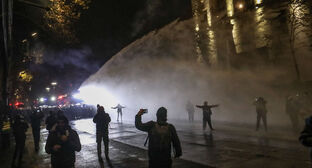14 June 2006, 23:53
Discrimination of national minorities continues in Krasnodar region
Some ethnic groups residing in Krasnodar Territory have not been recognized as citizens of the Russian Federation. They include those who have been residing there since 1991 - they should have been recognized as citizens under art. 13, item 1, of the 1991 RF law on citizenship, stated Marina Dubrovina, lawyer of Novorossiysk human rights committee, at the meeting of representatives of Russian non-government organizations (NGOs) with Dudu Dien, special UN rapporteur on racism and xenophobia, which took place on June 12 at the office of the "Memorial" Centre.
"Turkish Meskhetins have been residing in Krasnodar Territory for 15 years, not having even basic rights. Almost all of them have left, but there are other ethnic groups, such as Kurdish Ezides, Khemshils, Kurmanches (Batumi Kurds), who came later than the Turkish Meskhetins but still stay in Krasnodar Territory for 10-12 years. They are not citizens and are not registered at their location. This deprives them of access to employment, education, medical service, social protection, etc.," told Marina Dubrovina to the "Caucasian Knot" correspondent.
"While in Niberja, I visited a family. There was a man dying in his bed. He could not apply to a hospital because he had no medical insurance policy, not being registered at his residence, and had no money to pay for treatment. The family consists of 10 persons, the house is very small. The family lives on 100 roubles per day and the sick man said he could not afford spending money on treatment," cites the human rights activist.
According to M. Dubrovina, before the laws on citizenship and legal status of foreign citizens came into force in 2002, representatives of Turkish Meskhetins and other national minorities had been granted by the authorities temporary registration at the place of their residence. They were able to exist more or less decently: they worked, rented land, etc. But then registration at the place of residence was suspended. "Militia officers know that in this or that village certain people have been living for 15 years. However they come every two-three months and fine them for lack of registration. The fine amounts to one thousand roubles. Still, they are not deported from the country," says Dubrovina.
However, there have been cases of deportation. Marina Dubrovina says: "There is a family which came to Belorechensk district, Krasnodar Territory, in 2001: Bakir Gurji-ogly, citizen of Kirghizia, a Kurmanch, his wife and two children, RF citizens. We prepare a complaint to file in the European Court on Human Rights. They met Bakir in the street, revealed the lack of registration and immediately took him to court. He was unable to defend himself, had no access to legal defence, and on May 13, 2004, the court ruled on his deportation from Russia to Kirghizia. The ruling had not been enforced because he applied to our organization for help. We repeatedly appealed against the ruling, applied to the prosecutor's office asking them to protest against the court ruling which had entered into force. We received refusals everywhere. Last April he was again taken to administrative responsibility for lack of registration at the place of residence, but this time without deportation. In May 2005 one year passed since the court had adopted the ruling. Pursuant to the CAO, if the court ruling has not been enforced within one year, it becomes ineffective. In September 2005, Bakir Gurji-ogly was visited by immigration service officers and taken first to the pre-trial prison for one night, and then to the deportation centre where he was held until December. The prosecutor's office responded to our complaint that Gurji-ogly was imprisoned upon the court ruling, although the term for its enforcement had expired long before. He was deported from Russia on December 10. They bought him a ticket to Kazakhstan, two-and-a half thousand kilometres from Kirghizia. They took his passport, gave him no food or the money to buy food. This is a violation of the European Convention on Human Rights and there exists a precedent on the case in the European Court."
The passport and visa service (PVS) of Krasnodar Territory has an established practice of denying temporary residence permits. "Irrespective of what documents have been collected by the person or what evidence he submits to prove his claim of citizenship, the PVS denies him on the ground of his nationality. If the applicant has a non-Slavonic name, he is denied the temporary residence permit. According to M. Dubrovina, appeals to court, as a rule, are declined before consideration of the case on the merits. The law suits are set aside."
Beatings and murders of representatives of national minorities based on national intolerance also take place in Krasnodar Territory. There were two such murders in 2005. According to the lawyer of the Novorossiysk human rights committee, the investigation fails to duly investigate or consider the motif of ethical hatred in the offenders' actions. The attitude of judges and law-enforcement officers towards representatives of national minorities is often hostile. "I have heard myself a judge saying: "you - Turks, sit and keep silent." Employees of courts and law-enforcement agencies take the liberty of making xenophobic statements," notes Marina Dubrovina.
Author: Vyacheslav Feraposhkin, CK correspondent




